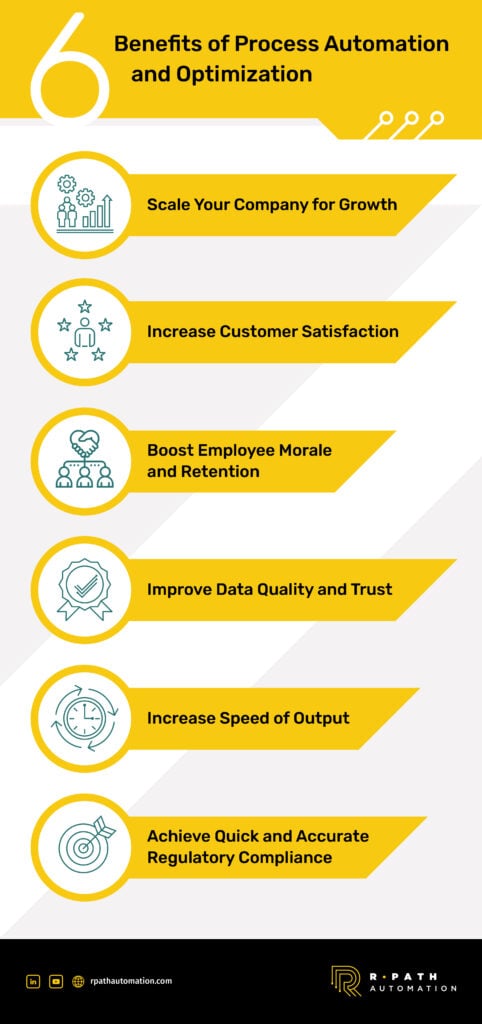With robotic process automation (RPA) exploding across industries, a growing number of businesses understand the need to implement winning automation solutions—and gain a powerful competitive edge.
RPA reimagines your workplace from the ground up, transforming quality, efficiency, customer satisfaction, and employee happiness. It’s also a major investment—which means the right support is essential. With a focused business case, you can win over critical stakeholders—such as your key executives, operations manager, IT director, or finance team—and drive your new automation capability forward.
Automation: a full-fledged capability
When implemented fully, automation almost never addresses a single project or process. Instead, the best automation solutions encompass capabilities, seamlessly unifying and bolstering all interrelated processes. While a project-like approach might strengthen a single firewall, a capability can power an entire cybersecurity department. In the same vein, R-Path acts as our clients’ automation department, implementing unique capabilities that can turbocharge a range of operations across your entire business.
Think of it this way: an automation project streamlines a single process in isolation, immediately driving some efficiency. Invoicing, for example, is never about a single task: the process itself encapsulates multiple checkpoints and dependencies. Invoicing processes therefore benefit most from a capability—one that can simultaneously transform invoicing and every sub-process that surrounds it.
At R-Path, we build custom scripts that handle every possible “exception,” such as a late fee, erroneous calculation, missed payment, or accidental double billing event. By simultaneously addressing both the direct and contingent scopes of the process in question, we propel teams forward—without any surprises along the way. Now, think of the possibilities across the full range of back-office capabilities—including HR, order fulfillment, and compliance—and watch automation support growth, increase customer satisfaction, reduce errors, and so much more.
1. Bigger scaling and growth potential
Say your operations team is focused on an aggressive growth objective. To meet that goal, they might dive headfirst into hiring or outsourcing. But if your entire business is bogged down with everyday inefficiencies, the associated efforts—such as recruitment, training, and overhead—will fall short of the intended payoff.
Luckily, this obstacle isn’t insurmountable. The right automation capability can perform mundane, time-consuming work at exponentially higher volumes—and at a fraction of the cost. Automation can support strategic hiring decisions, allowing you to meet ambitious goals without overhauling daily operations.
2. Higher customer satisfaction
Today, customers continue to raise their expectations higher and higher. For your brand, particularly your customer success team, the stakes are greater than ever—which converts every service breakdown or delay into a reputational risk vs. temporary setback.
Automation can tie together disparate systems and streamline clunky communication processes. Instead of waiting weeks for an answer to filter through a chaotic service chain, customers get a single-call resolution for the most common requests. In turn, customer success teams can work faster and more effectively—as well as feel more confident in their ability to do their job.
3. Better employee retention rates
As the battle for top talent rages on, hiring managers can arm themselves with something unexpected: humanizing the everyday job. Rather than assign dull, low-value work to employees, companies can automate tedious tasks, reserving the most creative, strategic work for their people. This leads to happier teams, heightened productivity, and stronger retention.
4. Stronger quality and trust
Even among the most meticulous employees, human error is inevitable—and can result in customer attrition, revenue loss, reputational damage, compliance emergencies, and more.
With the right automation partner, your customer service, quality assurance, and compliance teams can breathe a collective sigh of relief. With a new automation capability, it’s possible to eliminate human error entirely—and, in turn, revolutionize your data entry, system communications, and data security strategies. As an added bonus, your liability risk goes down as you reduce the number of employees necessary to handle sensitive information.
5. Faster output
In nearly every industry, speed is imperative. Think about your most time-consuming workflows: is manual data analysis slowing things down? What about your customer registration process? Why spend days working on a task that can be accomplished in seconds?
Process automation can perform any tedious manual task at lightning speed—far faster and more precisely than a human. Work smarter, not harder—and watch your efficiency accommodate your most aggressive growth goals.
6. Simpler compliance
Your compliance team bears high-stakes responsibilities. After all, they need to produce accurate data, maintain precise and detailed records, and keep pace with ever-evolving requirements. A single error or delay can result in major ramifications—which means accuracy and timeliness are critical.
With an automated data workflow, your business can stay totally compliant, pivoting quickly as regulations or needs evolve. Say goodbye to human error, system mix-ups, and potential data breaches—a far more reliable compliance process awaits.
No matter whose day-to-day work is at stake, the right automation capability can elevate your entire business. Each automation solution offers unique benefits to its stakeholders, unifying teams and driving organization-wide productivity. Think about your operations team, IT leaders, and other key voices: which of these drivers might resonate with them most? With an effective business case, you can tangibly demonstrate the effectiveness of process automation and quickly reach a consensus. Turn the transformative effects of automation into a reality—and watch your everyday workflows flourish.
